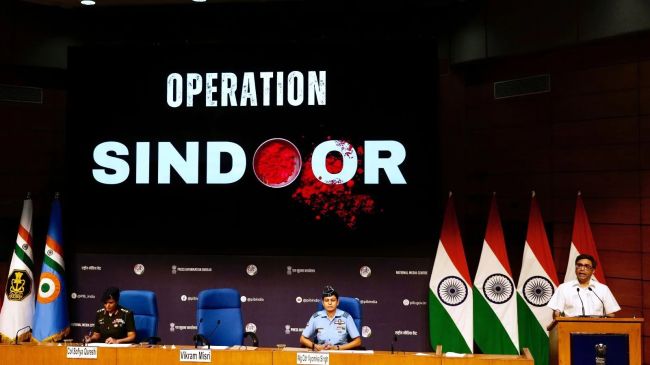Opinion After Operation Sindoor, past assumptions in Pakistan of an Indian response no longer hold true
Message of Operation Sindoor is that India is done with the charade of exchanging dossiers and evidence and being a plaintiff before a UN Security Council whose methods allow Pakistan to take refuge behind one of its Permanent Members. The other message is that India is done with living under the shadow of nuclear blackmail and sub-conventional warfare
 What has changed with Operation Sindoor is that the past assumptions of an Indian response no longer hold true
What has changed with Operation Sindoor is that the past assumptions of an Indian response no longer hold true One of the pithiest expositions of India’s approach to Pakistan was given by Prime Minister Narendra Modi in an interview in April 2024. On being asked about his views on Pakistan, he remarked that Pakistan had got the homeland it wanted in 1947. As far as India is concerned, he said, we want to live in peace with them and would be happy if they spent their time and energy focusing on their livelihood and earning their daily bread.
In its history with Pakistan, India has tried every option to establish a normal relationship, as was the promise after the creation of that state, and as behoves two neighbours. The unfortunate reality is that none of these have worked. This is for many reasons but a lack of effort on India’s part is surely not one of them. This is not opinion, but fact. All we have to do is to look at the record of successive Indian prime ministers and governments. The answer, unfortunately, seems to lie in the nature of the Pakistani state and the make-up of those who have governed it since its inception.
India would like a Pakistan that is at peace with itself, and comfortable in its skin. It seems, however, that this is asking for too much. The question then arises about the kind of policies India must craft to deal with a state that exhibits the strategic equivalent of an obsessive-compulsive disorder.
Again, for many reasons, Pakistan enjoyed decades of global indulgence, especially from the West, and particularly from the Anglo-Saxon world. In fact, it’s more than indulgence. The West is culpable for using Pakistan and building its terror industry. The Islamic world is actually ahead of the West in recognising the dangers posed by Pakistan not just to itself but to them. China, too, despite its master-client relationship with Pakistan as part of its India policy, has shown signs of uneasiness with the trajectory of the Pakistani state.
Calls for equivalence between India and Pakistan and the urge to preach rather than partner, as recently articulated by the External Affairs Minister S Jaishankar, have prevented the creation of a unified international deterrent against Pakistani-origin terrorism. The problem is not Kashmir. Nor is it the solution, just as 1947 has not been the solution.
India does not desire any kind of escalation. Its actions reflect the two principles of the right to self-defence and the right to bring the masterminds and planners of terror attacks on its soil to justice. Both are not only universally recognised principles but have also been used in several instances across the world. Iran’s missile strikes on terrorist camps in Pakistan in January 2024 are a case in point. The message of Operation Sindoor is that India is done with the charade of exchanging dossiers and evidence and being a plaintiff before a UN Security Council whose methods allow Pakistan to take refuge behind one of its Permanent Members.
The other message is that India is done with living under the shadow of nuclear blackmail and sub-conventional warfare. Generations of Indians have been schooled in the belief that there is no option but an all-out war to fight the terror machine because Pakistan will retaliate and has suicidal instincts. This led to a sense of fatalism in the Indian mind over the years. India’s reward for forbearance was not the absence of terrorism but of praise for being mature and “responsible”.
It is not that Operation Sindoor is the brahmastra of India’s anti-terror strategy. No doubt, the impulse to use terror as a weapon of state policy will survive and continue. What has changed is that the past assumptions of an Indian response no longer hold true. Handlers in Rawalpindi have lived too long in the comfort of waging asymmetrical warfare, counting on India’s reluctance to take meaningful action.
Attacks such as in Pahalgam do not happen overnight. They are the result of meticulous planning that includes their timing, location and methodology. In its barbarity and lethality, the Pahalgam attack is next only to the Mumbai 26/11 attacks. At a minimum, Operation Sindoor is a message to Pakistan that it has not done enough to control the forces of terrorism on its soil and at a maximum, that it is in fact complicit. Both the Lashkar-e-Taiba and Jaish-e-Mohammed are creatures of the Pakistan Army and the ISI. If Pakistan is not willing or able to destroy its terror infrastructure, there is no choice but for India to do the work for it, much as the way the US took matters into its own hands to take out Osama bin Laden.
India is no longer impressed by Pakistan’s threat of an all-out war, uncontrolled escalation and massive retaliation, or more importantly, its brandishing of the nuclear threat. Pakistan has held the world and India to nuclear blackmail for far too long. Its military has schooled its civilian and diplomatic foot soldiers into believing this and they have dutifully echoed it at the slightest opportunity. Operation Sindoor, and before it, the responses in 2016 and 2019, have shown that there are military and other choices available to India that are becoming smarter, more potent and more precise while still being restrained. The missile strikes on May 7 have been the largest by India in Pakistan in recent decades.
The whole turn of events is unfortunate but not called upon by India. The people of the Kashmir Valley were the biggest beneficiaries of the tourist and economic boom of the last five years. This is a juggernaut that cannot be stopped.
most read
At this point, India’s policy is marked by a focus on safeguarding its own interests. It is neither looking for international endorsement nor is it wary of international opprobrium. International understanding would, however, be a logical expectation. Pakistan’s attempts to wave the Kashmir flag before the UN and its organs are no longer going to give Delhi sleepless nights. This is the playbook of the past.
We are in an evolving situation. Pakistan has threatened a response. It needs to be stated that the Indian planners have factored this into their actions, and we should assume they are prepared. Pakistan would be well advised by saner elements within its society and by its international well-wishers to avoid any miscalculation.
The writer is former Deputy NSA, former Indian Ambassador to Russia and Convenor, NatStrat





